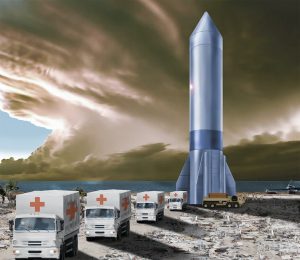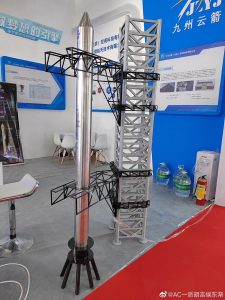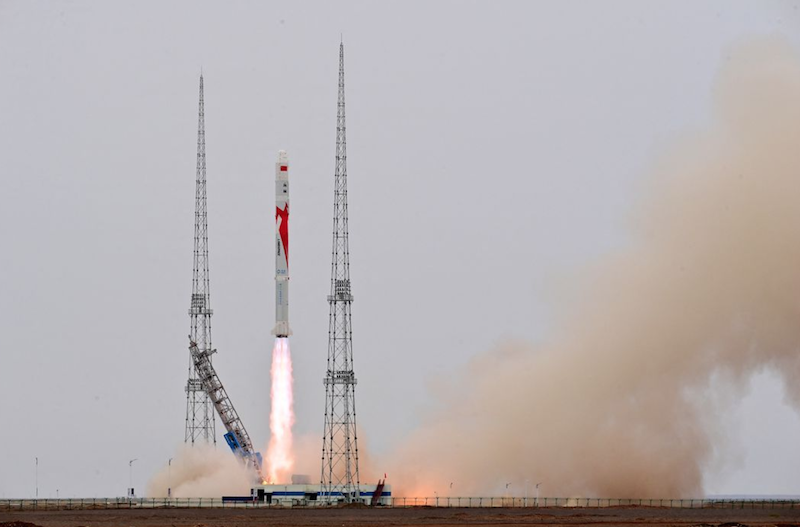Alibaba‘s e-commerce shopping platform Taobao is working with a Chinese startup that makes rockets in a bid to see if can create reusable rockets for express deliveries.
The rocket firm Space Epoch said on Sunday it is looking at reusable rockets for deliveries that could arrive in other countries around the world in an hour.
The project with online shopping platform Taobao is in early trial stages and aims to develop a rocket that can carry up to ten tons of cargo in a 120 cubic metre container, Space Epoch said in a notice posted on its official WeChat social media account.
ALSO SEE: Foreign Orders Lift China’s Manufacturing Again in March: Caixin
Alibaba did not immediately respond to a request for comment.
Beijing-based Space Epoch is looking to use its ‘Yuanxing-1’ rocket, which completed ignition and offshore recovery tests last year.
The company will carry out rocket delivery tests in the near future, noting that achieving its goals will not be easy in the short term.
President Xi Jinping has called for the expansion of strategic industries including the commercial space sector, deemed key to building constellations of satellites for communications, remote sensing and navigation.
Last year saw 17 Chinese commercial launches with one failure, among a new record 67 orbital launches by China. That was up from 10 commercial launches in 2022, including two failures.
Space Epoch secured 200 million yuan ($27.70 million) in its third financing round last November.

Half the size of SpaceX’s Starship
The US Air Force began studying cargo delivery by rockets in 2018, according to Wikipedia, which said the US Transportation Command talked with Elon Musk’s SpaceX in 2020 about delivery of 100 tons of cargo to countries around the world in under an hour via the company’s Starship.
The following year the Pentagon announced a Rocket Cargo programme led by the US Space Force, with funding of $9.7m in that financial year. And in 2022 the Air Force department awarded a $102m five-year contract to SpaceX to show it had the capability to carry military cargo and humanitarian aid around the world.
China also has a range of state and private companies seeking to develop rockets for the launch of cargo and satellites, although they appear to be a few years behind the US on doing this.
Space Epoch makes stainless steel rockets likely to be powered by engines that burn a mix of methane and liquid oxygen propellants, according to a report by Space.com in late 2022.

The firm “initially wants to develop a 210-foot-tall (64 metres) rocket capable of launching 14,330 pounds (6.5 tons) to a 1,100km (684-mile-high) sun-synchronous orbit, it said.
That would make it about half the size of SpaceX’s Starship, which was 120 metres tall and able to send 100 metric tons into low Earth orbit at that time.
“It is understood that the company is buying methane engines from another Chinese startup, engine maker Jiuzhou Yunjian, meaning Space Epoch does not have to develop its own engines,” the report said.
In January, Orienspace – a Chinese startup based in Haiyang – launched the most powerful rocket developed by the Chinese private sector.
The Gravity-1 rocket blasted off from a ship in the Yellow Sea off the coast of eastern Shandong province and delivered three remote-sensing satellites into orbit, Orienspace said in a statement.
Orienspace said the company had already secured orders for the launches of hundreds of satellites.
- Reuters with additional input and editing by Jim Pollard
ALSO SEE:
‘Don’t Help a Villain Do Evil’: China Slams SpaceX ‘Spy Network’
SpaceX Building Spy Satellite Network for US Reconnaissance
Japan’s Space One Rocket Explodes Seconds After Take-Off – JT
Russia, China Plan to Build Lunar Nuclear Power Plant by 2035
Chinese Startup Launches Most Powerful Rocket by Private Firm
China Fears US Will Use SpaceX to Bring Calamity to World
Elon Musk’s Starlink to Connect With Planes, Trucks, Ships
China Seeking Ways to Take Out or Control Enemy Satellites
China’s Low-Earth Satellites Push in Starlink Catch-Up Bid
China May ‘Need to Destroy’ Musk’s Starlink – SCMP
























